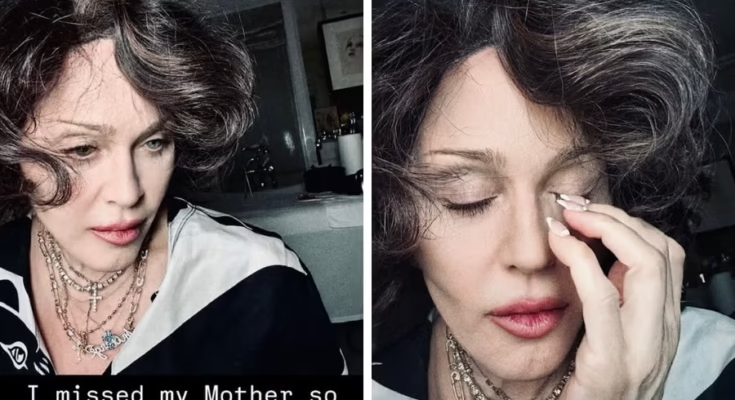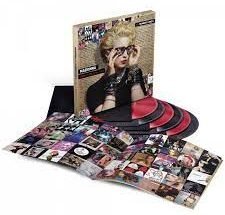In a surprising and increasingly controversial twist to Madonna’s storied career, the Queen of Pop is facing a wave of backlash in 2025—not for something she did, but for something she allegedly didn’t do. Fans and critics alike have taken to social media to voice their confusion, frustration, and disappointment surrounding a remix album titled Ray of Light by an underground electronic artist known as Veronica Electronica—a project that was long rumored to be Madonna’s own and now seemingly exists without her direct involvement.
The Mystery Behind Ray of Light (2025)
Earlier this year, music blogs and niche electronic communities began buzzing about a new remix project titled Ray of Light, named after Madonna’s critically acclaimed 1998 album. The twist? The album was being attributed not to Madonna herself, but to an enigmatic artist operating under the alias Veronica Electronica. Longtime Madonna fans immediately recognized that pseudonym—it has been whispered in fan circles for years as an alter ego Madonna once considered during her foray into experimental electronica in the late ’90s.
Rumors swirled that Madonna had a shelved remix project called Veronica Electronica, with rare or unreleased versions of Ray of Light tracks produced alongside the likes of William Orbit and Sasha. For decades, it remained in the realm of speculation, stoking fan curiosity.
Fast-forward to 2025, and an album using that exact concept—with deep ambient remixes of songs like “Frozen,” “Nothing Really Matters,” and “Swim”—quietly appeared on underground streaming platforms, credited not to Madonna but to Veronica Electronica. Within days, digital bootlegs were circulating and fan theories exploded online. Was this an authorized release? A tribute? Or something more controversial?
Fan Outrage and Accusations
When Madonna’s team remained silent, confusion grew. Devoted fans who had waited years for a proper archival release of Veronica Electronica felt blindsided. Not only was Madonna not behind this project, but there was also no official acknowledgment from her or Warner Records. Instead of being seen as a celebration of Madonna’s legacy, the remix album sparked accusations of:
- Cultural misappropriation of her legacy: Fans accused Veronica Electronica—whose real identity remains unconfirmed—of capitalizing on Madonna’s musical and visual identity without permission.
- Neglect by Madonna’s label: Critics argued that Warner Records missed an opportunity to curate and release an official remix project to coincide with the 25th anniversary reissues of Ray of Light (which many hoped would happen in 2023 or 2024).
- Authenticity erosion: The use of Madonna’s historic unreleased persona in a bootleg-like project blurred the lines between fan tribute, art project, and potential fraud. For many, it felt like a betrayal of the artist’s carefully crafted evolution.
“Veronica Electronica was supposed to be her statement,” one fan wrote on Reddit. “Now it feels like her vision has been hijacked. Where is Madonna in all of this?”
Madonna’s Silence Fuels Speculation
As the backlash mounted, many hoped Madonna would step forward to address the situation—whether to deny involvement, confirm knowledge of the project, or distance herself from the remix album. But so far, the 66-year-old icon has remained uncharacteristically silent.
That silence has led to a number of conflicting theories:
- Some believe the album is Madonna’s work, leaked prematurely under a different name to gauge fan interest or sidestep legal issues.
- Others are convinced it’s a rogue fan project that cleverly manipulates old stems, AI audio recreation, and stylistic mimicry to pass as legitimate.
- Still others argue it could be a sanctioned but anonymous art collaboration, perhaps part of a future rollout Madonna has not yet announced.
Whatever the truth, Madonna’s refusal to speak on the record has only deepened the controversy.
Music Industry Implications
This incident raises pressing questions about intellectual property, legacy control, and the line between homage and appropriation. As AI tools and digital distribution lower the barriers for music production, artists—especially legacy figures like Madonna—face new challenges in controlling their narrative.
Entertainment lawyer Fiona Hart weighed in, saying, “If Madonna did not authorize this project, she has grounds to pursue action. But the use of the name ‘Veronica Electronica’—which was never trademarked or officially launched—puts her in a grey area.”
Indeed, the gray area seems to be where this entire project lives: somewhere between fan fantasy, remix culture, and artistic provocation.
A Cultural Moment That Reflects a Larger Shift
At its core, the Ray of Light remix album controversy is about more than just a name or a series of tracks. It reflects the evolving tension between artist control and fan ownership of legacy. For many, Ray of Light was not just another pop album—it was Madonna’s spiritual and sonic rebirth. Seeing that legacy distorted or repurposed without her voice feels like a loss.
And yet, others are embracing the chaos. “This is the Madonna effect,” wrote one music critic. “She birthed a persona so powerful it transcends her own control. Whether she released this album or not, Veronica Electronica lives—and the conversation proves her continued cultural dominance.”
What’s Next?
As the debate rages on, fans are hoping for clarity. Will Madonna officially respond? Will Warner Records intervene? Could we see an official re-release of the long-rumored Veronica Electronica sessions—restored, remixed, and released properly?
Or has the genie already left the bottle?
Until then, the remix album titled Ray of Light by Veronica Electronica remains a symbol of the digital age’s complications—where identity, authorship, and legacy blur more than ever before.
Have you listened to the remix album? What do you think—authentic homage or unauthorized hijacking? Let us know in the comments.



